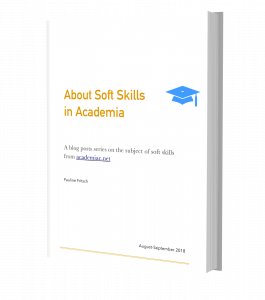Update May 2019: I’ve now made a resource for PhD students and postdocs in Switzerland listing Graduate Centers, Career Centers and Soft Skills Programs in Swiss Universities 🇨🇭
As we defined in this series’ first article, soft skills include management, scientific communication, teaching, and also working in a team, how to give feedback, personal communication, and many more.
Can one find training for all possible soft skills? I don’t know, but what one needs first is to know which training workshops, events or academic social activities are available for himself/herself.
When I started my PhD, as a foreign student setting foot in a city that I knew nothing about, in a university that I also didn’t know much about, I didn’t really know what kind of training I could get there. I knew it would be a good place for technical work, but before joining I didn’t even ask about other stuff, like soft skills. Actually I did not even know what to ask for because, as I realize now, I lacked the jargon or academic keywords to look for programs or events which could have been out there for me. As a result, it is only toward the end of my PhD that I finally had an overview of all those things which was available for me and from which I could have benefited earlier, when I needed them the most…
So here is a list of things to check out whether they might be there for you, my recommendations being to ask your colleagues about it (see next article about this point):
Within your field, or your university, or your country, or your funding body, could you benefit from:
- doctoral programs, coaching or mentoring programs,
- staff training programs
- career events, career seminars, or a career center
- women in science programs or events sometimes these events are also welcoming men
- students counseling office, international students’ office
- winter or summer school
- alumni event maybe they’ll mention if they benefited from special programs which you could access too
- PhD and postdoc club, union, association, community, alliance, network…
- PhD students’ retreats, welcome day or special events
- perhaps your university’s library has a graduate student-only area where you could learn more about students’ programs or events
- Other ideas for unique communication and presentation training: participating in events like Three Minute Thesis, science fair events, festivals, Pint of Science, Science Cafes and alike
Here I focused on “in real life” kinds of training and not on online resources because there are simply too many and I don’t know which ones are the best.
Is this list making you feel even more overwhelmed? It does to me! Stay tune for next week’s article to discuss more about that.
Sure enough, you can’t spend all your time preparing and attending such programs and events, you need a balance. Give yourself a clear limit. In my doctoral program we were limited to 3 soft skills workshops per semester. I think taking 2 or 3 days “off” your lab bench to work on your personal development sounds quite fair, doesn’t it?
If really none of these programs or events exist in your university, perhaps you could ask for it and push for it to be created. I believe things like PhD students and postdoc clubs could be initiated by students and postdocs 🙂 Open up the discussion, ask around you and maybe you’ll find other people in need of support and training and willing to join you in your quest. Have a look at this short column from Nature Jobs by young research investigators:
Self-taught soft skills – Nature Jobs – 2014
“We have found an easy and inexpensive way to foster our people skills by taking on the training ourselves. By forming a small group, we have learned soft skills from each other, as well as from resources found online.”
“In attempting to learn soft skills together, we have also enhanced each other’s science.”
And:
“No doubt skills could be learned by self-analysis to some extent, but learning in a group is more powerful.“
Did I forget something in this list? Please let me know in the comments 🙂
This article takes part in a series about soft skills:
- What are soft skills for academics?
- You already have more soft skills than you think and you can prove it.
- How to know which soft skills training is best for my career?
- This article
- Lack of communication about soft skills training programs in academia.
- Do senior scientists acknowledge the importance of early soft skills training?
I’ve put together these 6 articles in one PDF for you to read easily the whole series, you can subscribe here to get it!





0 Comments